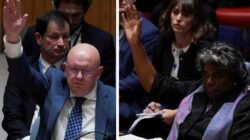NEW YORK: Salman Rushdie, who has been in exile for years after an Iranian fatwa ordered his assassination, was on a ventilator and may lose an eye after a stabbing attack at a literary event in New York state on Friday.
Following the incident, the British author of “The Satanic Verses,” which enraged some Muslims, was rushed to a hospital for emergency surgery.
Hadi Matar, a 24-year-old from Fairfield, New Jersey, was named as the alleged attacker by New York state police, who said he stabbed Rushdie in the neck and abdomen.
Prosecutors stated on Saturday that he was charged with attempted murder and assault.
“The perpetrator of yesterday’s attack, Hadi Matar, has now been formally charged with Attempted Murder in the Second Degree and Assault in the Second Degree,” Chautauqua County District Attorney Jason Schmidt said in a statement on Saturday.
“He was arraigned yesterday night on these accusations and jailed without bail,” the statement continued.
Schmidt stated that state and federal law enforcement authorities, including those in New Jersey, were working to determine whether more charges should be made and to comprehend the planning and preparation that led up to the incident.
According to Al Arabiya, local authorities confirmed that Matar is of Lebanese ancestry and hails from the southern town of Yaroun.
“The news is not good,” his representative stated in a statement obtained by The New York Times.
“Salman would most likely lose one eye; nerves in his arm were severed; and his liver was punctured and injured,” said agent Andrew Wylie. Rushdie, he added, was unable to talk.
According to Carl LeVan, an American University politics professor who was present at the literary event, the assailant went onto the platform where Rushdie was seated and “stabbed him repeatedly and violently.”
Several individuals rushed to the stage and wrestled the suspect to the ground before a trooper on the scene captured him. Until emergency first responders arrived, a doctor in the audience provided medical care.
The motivation for the stabbing is unknown.
According to authorities, an interviewer onstage, 73-year-old Ralph Henry Reese, received a facial injury but was released from the hospital.
The attack occurred at the Chautauqua Institution, which offers cultural programs in a peaceful lakeside village 70 miles (110 kilometers) south of Buffalo.
The Chautauqua Institution said in a statement, “What many of us witnessed today was a violent show of hate that rocked us to our core.”
According to LeVan, a regular at Chautauqua, the suspect “was trying to stab him as many times as possible before he was subdued,” and he believes the attacker “was trying to murder” Rushdie.
“There were cries of shock and panic from the audience,” stated the lecturer.
Rushdie, 75, shot to fame in 1981 with his second novel “Midnight’s Children,” which gained international acclaim and Britain’s renowned Booker Prize for its depiction of post-independence India.
His 1988 book “The Satanic Verses,” however, changed his life when Iran’s first supreme leader, Ayatollah Ruhollah Khomeini, issued a fatwa, or religious decree, ordering his execution.
Some Muslims saw the novel as derogatory to Islam and the Prophet Muhammad.
Rushdie, who was born in India to non-practicing Muslims and now considers himself an atheist, was forced to go underground after a bounty was placed on his head — a bounty that still exists today.
Following the death or attempted murder of his translators and publishers, the British government provided him police protection while he was at school and established his home there.
He spent over a decade in hiding, continually switching places and unable to tell even his own children where he lived.
Rushdie began to emerge from his exile in the late 1990s, after Iran stated in 1998 that it would not assist his killing.
He now lives in New York and is a champion for free expression, most notably launching a vigorous defense of the French satirical magazine Charlie Hebdo when its staff was gunned down in Paris by Islamists in 2015.
The magazine had featured drawings of Mohammed that sparked outrage among Muslims worldwide.
Global leaders were outraged by the attack on Rushdie, with French President Emmanuel Macron declaring that the author “embodied freedom” and that “his war is ours, a universal battle.”
US Vice President Joe Biden decried Rushdie’s “vicious attack,” praising him for his “refusal to be bullied or silenced.” Biden and his wife, Jill, “together with all Americans and people all across the world,” he wrote, “are praying for his health and recovery.”
Meanwhile, British Prime Minister Boris Johnson expressed his “outrage,” extending his condolences to Rushdie’s family and applauding the author for “exercising a privilege we should never cease to protect.”
According to US National Security Adviser Jake Sullivan, the attack was “reprehensible,” and “all of us in the Biden-Harris Administration are praying for his rapid recovery.”
Josep Borrell, the European Union’s foreign policy leader, condemned the attack on Rushdie “vehemently.”
“International rejection of such criminal actions, which violate fundamental rights and freedoms, is the only path toward a better and more peaceful world,” Borrell said in his tweet.
Source: AFP and Reuters










